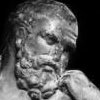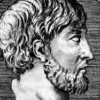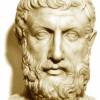Anaximander

Anaximander of Miletus (c. 611 - c. 547 B.C.) was a pupil of Thales and teacher of Anaximenes. He is credited with inventing the gnomon on the sundial and with drawing the first map of the world in which people live. He may have drawn a map of the universe. Anaximander may also have been the first to write a philosophical treatise. He believed in an eternal motion and a boundless nature.
Anaximenes

Anaximenes
Anaximenes (d. c. 528 B.C.) accounted for natural phenomena like lightning and earthquakes though his philosophical theory. A student of Anaximander, Anaximenes did not share his belief that there was an underlying boundless indeterminateness or apeiron. Instead, Anaximenes thought the underlying principle behind everything was air/mist, which had the advantage of being empirically observable. Different densities of air (rarified and condensed) accounted for different forms. Since everything is made of air, Anaximenes' theory of the soul is that it is made of air and holds us together. He believed the earth was a flat disk with fiery evaporations becoming heavenly bodies.
Archimedes

Archimedes of Syracuse (c.287 - c.212 B.C.), a Greek mathematician, physicist, engineer, inventor, and astronomer, determined the exact value of pi and is also known for his strategic role in ancient war and the development of military techniques. Archimedes put up a good, almost single-handed defense of his homeland. First he invented an engine that threw stones at the enemy, then he used glass to set the Roman ships on fire -- maybe. After he was killed, the Romans had him buried with honor.
Aristotle

Aristotle (384 - 322 B.C.) was one of the most important western philosophers, a student of Plato and teacher of Alexander the Great. Aristotle's philosophy, logic, science, metaphysics, ethics, politics and system of deductive reasoning have been of inestimable importance ever since. In the Middle Ages, the Church used Aristotle to explain its doctrines.
Confucius

The sagacious Confucius, Kongzi, or Master Kung (551-479 B.C.) was a social philosopher whose values became dominant in China only after he died. Advocating living virtuously, he put emphasis on socially appropriate behavior.
Galen

Galen was born in 129 A.D. in Pergamum, an important medical center with a sanctuary to the healing god. There Galen became an attendant of Asclepius. He worked at a gladiatorial school which gave him experience with violent injuries and trauma. Later, Galen went to Rome and practiced medicine at the imperial court. He dissected animals because he couldn't directly study humans. A prolific writer, of 600 books Galen wrote 20 survive. His anatomical writing became medical school standards until the 16th century Vesalius, who could perform human dissections, proved Galen inaccurate.
Heraclitus

Heraclitus (fl. 69th Olympiad, 504-501 B.C.) is the first philosopher known to use the word kosmos for world order, which he says ever was and ever will be, not created by god or man. Heraclitus is thought to have abdicated the throne of Ephesus in favor of his brother. He was known as Weeping Philosopher and Heraclitus the Obscure. Heraclitus uniquely put his philosophy into aphorisms, like "On those stepping into rivers staying the same other and other waters flow." (DK22B12), which is part of his confusing theories of Universal Flux and the Identity of Opposites. In addition to nature, Heraclitus made human nature a concern of philosophy.
Herodotus

Herodotus (c. 484-425 B.C.) is the first historian proper, and so is called the father of history. He traveled around most of the known world. On one trip Herodotus probably went to Egypt, Phoenicia, and Mesopotamia; on another he went to Scythia. Herodotus traveled to learn about foreign countries. His Histories sometimes read like a travelogue, with information on the Persian Empire and the origins of the conflict between Persia and Greece based on mythological prehistory. Even with the fantastic elements, Herodotus' history was an advance over the previous writers of quasi-history, known as logographers.
Hippocrates

Hippocrates of Cos, the father of medicine, lived from about 460-377 B.C. Hippocrates may have trained to become a merchant before training medical students that there are scientific reasons for ailments. Before the Hippocratic corpus, medical conditions were attributed to divine intervention. Hippocratic medicine made diagnoses and prescribed simple treatments like diet, hygiene, and sleep. The name Hippocrates is familiar because of the oath that doctors take (Hippocratic Oath) and a body of early medical treatises that are attributed to Hippocrates (Hippocratic corpus).
Parmenides

Parmenides (b 510 B.C.) was a Greek philosophy from Elea in Italy. He argued against the existence of a void, a theory used by later philosophers in the expression "nature abhors a vacuum," which stimulated experiments to disprove it. Parmenides argued that change and motion are only delusions.
Plato

Plato (428/7 - 347 B.C.) was one of the most famous philosophers of all time. A type of love (Platonic) is named for him. We know about the famous philosopher Socrates through Plato's dialogues. Plato is known as the father of idealism in philosophy. His ideas were elitist, with the philosopher king the ideal ruler. Plato is perhaps best known to college students for his parable of a cave, which appears in Plato's Republic.
Socrates

Socrates, an Athenian contemporary of Pericles (c. 470 - 399 B.C.), is a central figure in Greek philosophy. Socrates is known for the Socratic method (elenchus), Socratic irony, and the pursuit of knowledge. Socrates is famous for saying that he knows nothing and that the unexamined life is not worth living. He is also well known for stirring up sufficient controversy to be sentenced to a death that he had to carry out by drinking a cup of hemlock. Socrates had important students, including the philosopher Plato.
Thales

Thales was a Greek Pre-Socratic philosopher from the Ionian city of Miletus (c. 620 - c. 546 B.C.). He predicted a solar eclipse and was considered one of the 7 ancient Sages. Aristotle considered Thales the founder of natural philosophy. He developed the scientific method, theories to explain why things change, and proposed a basic underlying substance of the world. He started the field of Greek astronomy and may have introduced geometry into Greece from Egypt. Ab excessu divi Augusti 'Annals'
